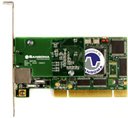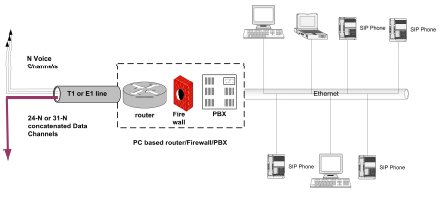PCI engines optimized for open-source PBX software
Feb 21, 2005 — by LinuxDevices Staff — from the LinuxDevices Archive — views Sangoma Technologies has customized its T1/E1/J1 voice/data boards to optimize their use as embedded PBX coprocessors. Dedicated PBX “engines” offload TDM voice traffic from a CPU, resulting in fewer dropped calls, less jitter and better voice quality, the company said. Sangoma's AFT (“Advanced, Flexible Telecommunications”) boards run free Linux PBX software called Asterisk for VoIP and traditional telephone networks.
Sangoma Technologies has customized its T1/E1/J1 voice/data boards to optimize their use as embedded PBX coprocessors. Dedicated PBX “engines” offload TDM voice traffic from a CPU, resulting in fewer dropped calls, less jitter and better voice quality, the company said. Sangoma's AFT (“Advanced, Flexible Telecommunications”) boards run free Linux PBX software called Asterisk for VoIP and traditional telephone networks.
“In all companies of any size, telephone connections are at least as vital as the electricity supply,” said Sangoma CEO David Mandelstam. “For soft PBX technology to succeed, reliability and perfect voice quality have to be a given, even before a user can begin to enjoy the powerful and customizable features this technology offers.”
The AFT T1/E1 boards are implemented as 32-bit PCI cards that plug into a 2U “slim-line” chassis. The model A101 provides a single T1/E1 interface, and the model A102 integrates two. In mixed voice/data installations, they separate data and voice traffic and handle them independently which the company said aids in speed and reliability.

Sangoma PBX architecture
Besides Asterisk, the boards also support “all popular open source projects,” according to the company, including YATE, SIPxchange, and OpenPBX. They are capable of serving as media gateways, transporting TDM voice, IP data, and video over T3/E3, T1/E1, ADSL, and serial links and supporting such protocols as ATM, Frame Relay, X.25, SS7, HDLC, and BiSync.
This article was originally published on LinuxDevices.com and has been donated to the open source community by QuinStreet Inc. Please visit LinuxToday.com for up-to-date news and articles about Linux and open source.